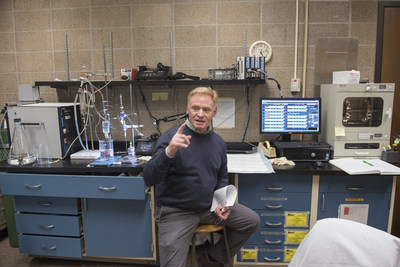Subjects: SVY, VET
Rosalind Franklin University Researcher Awarded Department of Defense Grant in Effort to Save More Lives on the Battlefield
NORTH CHICAGO, Ill., Nov. 10, 2017 /PRNewswire-USNewswire/ -- Advances in battlefield trauma care, fueled by evidence-based research and practice, are saving lives in both combat and civilian settings. At Rosalind Franklin University of Medicine and Science, researchers in the Resuscitation Institute are working under a $1.9 million grant awarded by the U.S. Department of Defense to investigate a better way to manage simultaneous hemorrhagic shock and traumatic brain injury (TBI).

"We're determined to find a way to treat wounded combat personnel who suffer both severe bleeding and TBI," said Resuscitation Institute Director Dr. Raúl J. Gazmuri, the principal investigator for the grant. Dr. Gazmuri is also a professor of medicine and physiology at RFU's Chicago Medical School and chief of critical care at the Captain James A. Lovell Federal Health Care Center.
The need for more effective treatment for the deadly combination was recognized as a research priority by the Defense Health Board in 2012. The board reported that "optimizing hemorrhage control and managing hemorrhagic shock in the battlefield offered the greatest potential to avoid preventable deaths." It emphasized the need for studies investigating optimal resuscitation strategies for casualties with TBI and who are in, or at risk of, hemorrhagic shock.
Seriously wounded fighters often die from severe bleeding before they can be evacuated to a medical treatment facility. An analysis of 4,596 battlefield fatalities from operations Iraqi Freedom and Enduring Freedom, 2001-2011, reported in the Journal of Trauma and Acute Care Surgery, revealed that 87 percent of all injury-related deaths occurred in the prehospital phase of care. Of these, 24 percent were deemed potentially survivable. Death was largely associated with hemorrhage in 91 percent. In addition, 50 percent of casualties who died after admission to a medical treatment facility presented with essentially irreversible hemorrhagic shock at the time of admission.
Conflicting treatment protocols pose a serious dilemma. Current guidelines for treatment of severe bleeding call for administration of the smallest possible amount of fluids to maintain the lowest tolerable blood pressure. Excessive fluids can reduce the ability of the blood to clot and intensify bleeding. But more liberal fluid administration maintains a higher blood pressure that could protect the brain from secondary injury caused by a shortage of blood and oxygen to the heart. Outcomes of TBI are strongly associated with systolic blood pressure ? an important determinant of brain blood flow.
Dr. Gazmuri and his team, in previous animal models of severe uncontrolled bleeding, found that the drug vasopressin and similar compounds have the ability to increase blood pressure by constricting arterial vessels in peripheral areas of the body. He hypothesizes that vasopressin could also help maintain blood flow to the brain when TBI occurs concomitantly with severe bleeding ? protecting the brain and saving lives.
"Our idea is that for a patient with hemorrhagic shock and TBI, you don't give fluids, but you stabilize them hemodynamically," Dr. Gazmuri said. "We're hypothesizing that vasopressin will help maintain blood flow to vital organs despite severe bleeding without having to give large amounts of fluid. We think we can do it with higher pressure that facilitates perfusion of the brain, which protects against further injury."
If successful, the approach could lead to a major shift in the care of casualties who sustain both hemorrhagic shock and TBI, Dr. Gazmuri said. The strategy would treat both conditions with vasopressin or similar compounds, while achieving hemodynamic stability with a small amount of fluids. It could benefit the logistics of fluid transport to combat zones and potentially lead to the more cost-effective development of fluids with oxygen-carrying capacity and hemostatic (stopping the flow of blood) properties, achieving the desired effects with less volume.
The findings could be translated to civilian settings, where hemorrhage and TBI also cost lives and inflict permanent disability.
The three-year study, "Sustained V1A Receptor Activation for Prolonged Hemodynamic Support and Neurological Protection after Non-Compressible Hemorrhage and Traumatic Brain Injury," will be conducted by Dr. Gazmuri and co-investigators Pierre Rivičre, PhD, and Regent Laporte, PhD, who bring expertise in peptide development. The team will investigate currently available drugs and work on novel compounds for easier use on the battlefield.
Ronald Kaplan, PhD, RFU executive vice president for research, said federal funding in this area is key to advancing medical research that can help save lives.
"Rosalind Franklin University is committed to improving the health and well-being of our nation's military members and veterans," Dr. Kaplan said. "Our Resuscitation Institute, under Dr. Gazmuri's leadership, is making important advancements in critical care medicine that could potentially save and improve the quality of their lives and the lives of civilians in need of emergency treatment and care."
About Rosalind Franklin University of Medicine and Science
Formed in 1912 as the Chicago Hospital-College of Medicine, Rosalind Franklin University of Medicine and Science is a national leader in interprofessional medical and healthcare education and biomedical research. RFU includes the Chicago Medical School, School of Graduate and Postdoctoral Studies, College of Health Professions, Dr. William M. Scholl College of Podiatric Medicine and College of Pharmacy. More than 18,000 RFU degreed alumni are active throughout the United States and around the world. Learn more at rosalindfranklin.edu.
Office of Marketing and Communications
[email protected]
847-578-8313
SOURCE Rosalind Franklin University of Medicine and Science
These press releases may also interest you
|
News published on and distributed by:



